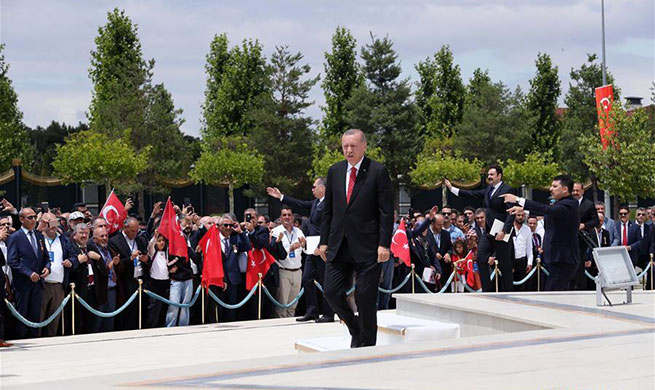NAIROBI, July 16 (Xinhua) -- The Pan African counter-terrorism summit in the Kenyan capital here set the stage for reorganization of initiatives aimed at containing a security threat that is rapidly evolving on the continent.
High-profile delegates who attended the forum from July 10 to 11, including United Nations (UN) Secretary-General Antonio Guterres and Kenyan President Uhuru Kenyatta, agreed that African countries must devise new strategies to revitalize the war against terrorism.
DANGEROUS FOOTHOLD
The UN chief said in his opening remarks that international terrorist networks continue to gain foothold in Africa, hence the need for concerted efforts to degrade them through adequate funding, political stability, rule of law and engagement of women and youth.
"For terrorism to be defeated, it is essential that African counter-terrorism is holistic, well-funded, underpinned by respect for human rights and most importantly backed by strong political will," said Guterres.
He hailed innovative counter-terrorism initiatives that focus on enhanced cross-border intelligence sharing and involvement of youth and women to educate communities on the dangers of violent extremism.
More than 1,497 delegates, including political leaders, policymakers, security experts and peace advocates, attended the Nairobi forum to discuss best practices that should be adopted to re-energize the fight against terrorism in Africa.
Kenyatta said Africa must speak boldly and with one voice, adding that African countries should leverage robust military campaigns, good governance, inclusive development and empowerment programs tailor made for vulnerable demographics in order to win the fight against terrorism.
"These measures require extensive support in terms of funding, logistics, legal frameworks and multilateral cooperation," said Kenyatta, adding that African countries should deploy more resources to counter recruitment of youth by militant groups.
He said that grassroots-based campaigns against violent extremism as well as empowerment of vulnerable youth through education, skill development and employment, are key to containing the spread of violent ideologies in Africa.
Kenya partnered with the UN to convene the Pan African forum, in a bid to chart a new beginning in the war against terrorism and violent extremism that have wreaked havoc on a continent hailed as the next frontier for growth and transformation.
AFRICAN SOLUTION
Vladimir Voronkov, under-secretary-general of the UN Counter-Terrorism Office, said the forum injected fresh momentum to promote an African-led solution to a security challenge that transcends borders.
"The conference demonstrated the importance of African-led and African-owned counter-terrorism efforts that are strengthened by the solidarity and collective responsibility of the international community," said Voronkov.
He said the UN will help African countries strengthen their capacity to disrupt terrorism financing and recruitment of fighters through early detection.
Voronkov said the UN is mulling the establishment of an inter-agency platform in Kenya and other African countries to facilitate the exchange of biometric data on foreign fighters.
"We intend to establish an annual counter-terrorism dialogue between the UN and African regional bodies to help initiate practical steps to address the scourge of terrorism," said Voronkov.
EMPOWERING YOUTH
African states should enhance sharing of best practices that are required to rejuvenate anti-terrorism fight against a backdrop of shrinking external support.
Policymakers and experts who attended the Nairobi summit said that successful and home-grown counter-terrorism strategies like community policing, cross-border intelligence sharing and robust action on illicit financial flows should be scaled up.
Martin Kimani, director of Kenya's National Counter-Terrorism Centre, said enhanced vigilance combined with punitive legislation and empowerment of disadvantaged youth should inform the next phase of the war against violent extremism in Africa.
"We should exhaust the legal, diplomatic and financial tools at our disposal to achieve the goal of an African continent that is resilient to the threat of terrorism and radicalization of its youth," said Kimani.
Unlike brute force, inclusivity, fidelity to the rule of law and access to equal opportunities could prove more effective in defeating terrorism in Africa, said Khanneje Hassan, director of the Horn International Institute for Strategic Studies.













